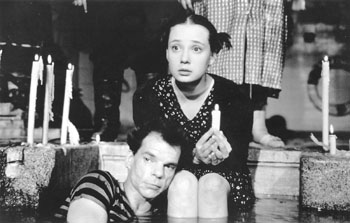![[Metroactive Movies]](/movies/gifs/movies468.gif)
[ Movies Index | Show Times | Silicon Valley | Metroactive Home | Archives ]
 Waterworld: Chulpan Khamatova and Denis Lavant take a dip in 'Tuvalu.' The Perfect Squalor A crumbling bathhouse in an imaginary country evokes hideo-comic rapture in 'Tuvalu' WHEN FILM critic John Powers interviewed David Lynch recently, the director was discovered poring over an album of photographs of abandoned Polish factories. I was dying to look over Lynch's shoulder. Ruins on the wrong side of the Iron Curtain have galvanic appeal for us fans. The appeal is deeper than just gloating at other people's architectural shame. After all, we live in a valley in which the cheap, ugly building is king. Touring the North First Street corridor from the airport to Alviso--uggggggly! Impersonal, miserly, colorless--fetch the Roget's. These infinite miles of identical light-industrial boilerplate are miserable, but there's no pizzazz. To ugly-building fans, touring them is like expecting to thrill over the misdeeds of a serial killer only to discover that the movie you've rented is actually about a compulsive litterbug. Have you seen the Palace of the People in Bucharest, Rumania? That's the kind of shock I mean. It's not just ugly, but gargantuan, threatening, built to make the passerby feel like the worthless insect he is. Until we learn to reach for the stars like the Stalinist builders of yore (give us 25 years, and we'll defy Warsaw!), a film like Viet Helmer's Tuvalu serves as a prime example of this ugly-building rapture. It's set in a half-abandoned public bath (the location was Sofia, Bulgaria). This unnamed bath is the one last, lone, sad building standing in the way of a new development: a planned city that promises to be not only malfunctional but ugly enough to induce strokes. The development is to be called "Gregorgrad." Gregor is our story's Bluto, played by Terrence Gillespie, a neckless actor crowned with a big Lyle Lovett/Eraserhead conk of hair. The nameless bathhouse preventing the construction of Gregorgrad is run by Gregor's gentle brother, Anton (Denis Lavant). How to describe the rot of this bath? The Styxlike depths of it; the strange cashier who will as soon accept buttons as money; the piping system worthy of Curly's handiwork in the Three Stooges short A-Plumbing We Will Go; the ceilings' plaster classical bas-reliefs, ready to fall down and brain the luckless bather; the gasping of the dented metal hairdryer. One of the earliest gags shows us a little girl digging in her heels to avoid being hauled inside this horror-natatorium. Anton is keeping the place open as a favor to his granddad, who has been blind as a bat for decades. The old man is ready for the undertaker, but he keeps up appearances. Using inflatable shoulder pads to give himself muscles, he sits on his lifeguard platform, bleating on a metal whistle at the nonexistent horseplay in the murky waters below him. Anton, like Buster Keaton in The General, is in love with a machine and a girl. The machine is the bath's water pump, which keeps the place afloat for the half-dozen people who still attend. This water pump seems to be the only thing that works in this entire imaginary country. The girl, Eva (Chulpan Khamatova), has some kind of water-naiad thing going on for her; she loves to bathe naked with her pet goldfish. This nymph never says much, but then, Tuvalu is essentially a silent film, with perhaps 30 words of dialogue in the whole thing. Tuvalu has been likened to Chaplin movies, but Chaplin would have been gazing wistfully at this one spot of feminine beauty. Anton is paralyzed with fascinated lust. He first really spies her through a hole in the shower. She sees him and giggles, teasing him through the floorboards with her bra, as you'd tantalize a cat with a string. When her father perishes, killed by a chunk of falling plaster, Eva decides to head out in his boat as far away from Eastern Europe as she can get. To repair her boat, she needs a precious mechanical valve from the bathhouse's prized water pump. Tuvalu is the name of an actual South Pacific island, representing, as the Xavier Cugat song "Brazil" did in Brazil, a tropical paradise far away from the grimy realities of post-everything Eastern Europe. As in Brazil, the squalor in Tuvalu is so bad it's an energetic joke. Every day here is a rainy day, even the sunny ones. The bathhouse crew is bedeviled by inspectors on bicycles and pestered with official documents covered with Saul Steinberg seals and stamps. It's probably the most efficient use of Balkan squalor for comedy since Orson Welles' version of The Trial. As in Jeunet and Caro's The City of Lost Children and Delicatessen, the unaesthetic quality is so powerful that it's an aesthetic in itself. But the dialogue is mute gesticulation, with sound effects instead of talk. Tuvalu is really more like one of Jacques Tati's odd-duck comedies in which the hideo-comic architecture is as funny as the characters.
Tuvalu (Unrated; 101 min.), directed by Veit Helmer, written by Michaela Beck and Helmer, photographed by Emil Hristow and starring Denis Lavant and Chulpan Khamatova, opens Friday at Camera 3 in San Jose. [ Silicon Valley | Metroactive Home | Archives ]
|
From the December 13-19, 2001 issue of Metro, Silicon Valley's Weekly Newspaper.
Copyright © 2001 Metro Publishing Inc. Metroactive is affiliated with the Boulevards Network.
For more information about the San Jose/Silicon Valley area, visit sanjose.com.